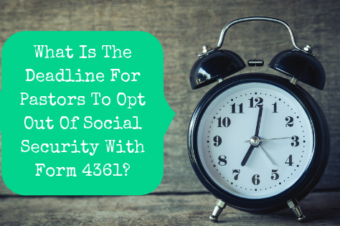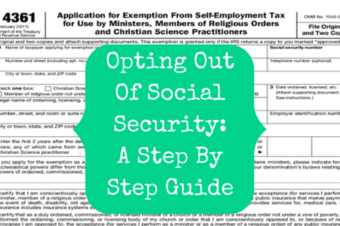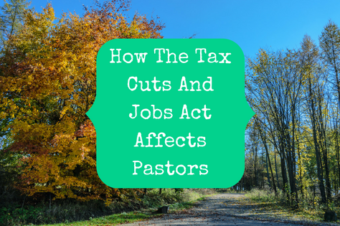If you’re new to the ministry, you may have heard about Form 4361 from someone. Likely another pastor has mentioned it and told you that it will save you a lot of money. What is this mysterious money-saving piece of paper?
What Is Form 4361?
Form 4361 is an IRS document that is used by ministers to opt out of public insurance programs. You can view the form itself here. Its official name is Application for Exemption From Self-Employment Tax for Use By Ministers, Members of Religious Orders and Christian Science Practitioners, which is why most people just refer to it as Form 4361.
The title references being exempt from self-employment tax because that is what is used to fund the public insurance programs Social Security and Medicare. An exemption means you don’t have to pay the taxes but you also don’t get to benefit from the programs (based on your exempt ministerial income).
The form includes your personal information, contact information, and also the information for the church or body that ordained, licensed, or commissioned you. You also have to give information regarding the date you were ordained, licensed, or commissioned, and when you have received $400 or more in self-employment income, at least some of it as compensation for ministerial services. That is because you have a limited time in which you are eligible to file the form and claim an exemption.
The Opportunity To Opt Out Of Self-Employment Taxes
As already mentioned, self-employment taxes are the 15.3% that ministers have to pay to fund Social Security and Medicare (even if you’re an employee of a church). Social Security is the safety net program that the US government developed in response to the crisis of the Great Depression. It has evolved over the years and now provides retirement benefits, survivor benefits, and disability benefits. Medicare is the program that provides healthcare for Americans over age 65.
Unlike most everyone else, pastors have the option to opt out of participation in these programs, and therefore, their taxes. Don’t you feel special?
Not all pastors can opt out, though. You can only opt out if you can sincerely say, “I am conscientiously opposed to, or because of my religious principles I am opposed to, the acceptance (for services I perform as a minister, member of a religious order not under a vow of poverty, or Christian Science practitioner) of any public insurance that makes payments in the event of death, disability, old age, or retirement; or that makes payments toward the cost of, or provides services for, medical care. (Public insurance includes insurance systems established by the Social Security Act.)”
Why Would A Minister Opt Out?
It is illegal to opt out for economic reasons. The IRS makes that very clear. A legal exemption is based on one of two things:
- Conscientious opposition to the acceptance of public insurance
- Religious principles that oppose the acceptance of public insurance
So, it has to be either your conscience or your religious principles that drive the decision. The decision itself is about public insurance, which encompasses Social Security and Medicare.
I know a lot of pastors who opt out do so on the basis of the principle of stewardship. Everything we have is God’s and we are instructed to manage it wisely. Giving it to the government to mismanage is not good stewardship.
The Bible says that “a good person leaves an inheritance for their children’s children.” (Proverbs 13:22, NIV) Because of this, some pastors feel that it is wrong to prepare for the future by putting money into a system that won’t leave an inheritance for your children when you can easily save in a way that does.
For others, they equate accepting public insurance as relying on the government for provision instead of God. Dependence on the government violates their conscience and religious principles so they have grounds to request an exemption.
Warnings For Ministers Who Opt Out Of Social Security
Whether or not you choose to opt out is a personal decision that you need to pray and think deeply about. You will find some very strong opinions on the matter online, but I’m not here to tell you what decision to make. I do need to warn you, though, of the consequences of your decision.
If you choose to opt out of Social Security, you need to make up for the benefits the program provides on your own. You need to provide your own retirement savings, life insurance, and disability insurance. You can read all about how to do that here.
Some other articles that you might find useful are:
Opting Out Of Social Security: A Step By Step Guide
What You Need To Know About Social Security Even If You’ve Opted Out
Can You Still Receive Social Security Benefits Even After Opting Out?
How Medicare Works For Pastors Who Have Opted Out Of Social Security




